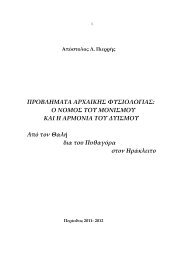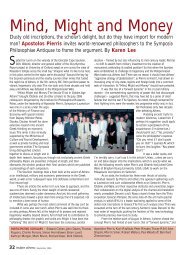chapter 10 the monism of darkness and the dualism of limit and ...
chapter 10 the monism of darkness and the dualism of limit and ...
chapter 10 the monism of darkness and the dualism of limit and ...
You also want an ePaper? Increase the reach of your titles
YUMPU automatically turns print PDFs into web optimized ePapers that Google loves.
112 CHAPTER <strong>10</strong><br />
Waters, in <strong>the</strong> pre-eternal Chaos <strong>of</strong> Indeterminacy (analogous to <strong>the</strong><br />
crossing, ford (applefiÚÔ˜) <strong>of</strong> a river), maybe earth itself as it emerges <strong>and</strong><br />
assumes form from <strong>the</strong> waters (by condensation <strong>of</strong> <strong>the</strong> slime <strong>of</strong> primordial<br />
liquidity). Finally, <strong>the</strong> plastic, formative principle is called £¤ÙȘ (She who<br />
sets <strong>and</strong> determines), equivalent in all likelihood with ArÛ· (<strong>the</strong> fate<br />
(ÌÔÖÚ·, lot, part) <strong>and</strong> portion <strong>of</strong> destiny belonging to each thing). Alcman’s<br />
cosmogony is preserved in a scholium on a poem <strong>of</strong> his (possibly a maidensong),<br />
5 Fr. 2 col. iii Davies:<br />
(v. 3)... âÎ ‰b Ùá apple[Ú¤ÛÁ˘˜ fiÚÔ˜ Ù¤Î̈Ú<br />
(v. 7)ó˜ ÁaÚ õÚÍ·ÙÔ ì ≈ÏË Î·Ù·Û΢[·ÛıÉÓ·È<br />
âÁ¤ÓÂÙÔ applefiÚÔ˜ ÙȘ ÔîÔÓÂd àÚ¯‹Ø Ï[¤ÁÂÈ<br />
ÔsÓ ï \AÏÎÌaÓ ÙcÓ ≈ÏËÓ apple¿Ó[ÙˆÓ ÙÂÙ·-<br />
Ú·Á̤ÓËÓ Î·d àapplefiËÙÔÓØ ÂrÙ· [ÁÂÓ¤-<br />
Ûı·È ÙÈÓ¿ ÊËÛÈÓ ÙeÓ Î·Ù·Û΢¿[˙ÔÓÙ·<br />
apple¿ÓÙ·, ÂrÙ· ÁÂÓ¤Ûı·È [applefi]ÚÔÓ, ÙÔÜ [‰b applefi-<br />
ÚÔ˘ apple·ÚÂÏıfiÓÙÔ˜ âapple·ÎÔÏÔ˘ıÉ[Û·È] Ù¤-<br />
Î̈ÚØ Î·d öÛÙÈÓ ï ÌbÓ applefiÚÔ˜ ÔxÔÓ àÚ¯‹, Ùe ‰b Ù¤-<br />
ÎÌˆÚ ÔîÔÓÂd Ù¤ÏÔ˜, Ùɘ £¤ÙȉԘ ÁÂÓÔ-<br />
̤Ó˘ àÚ¯c ηd Ù¤[Ï]Ô[˜ Ù·Ü]Ù· apple¿ÓÙˆÓ â-<br />
Á¤ÓÂ[Ù]Ô, ηd Ùa ÌbÓ apple¿ÓÙ· [ïÌÔ]›·Ó ö¯ÂÈ<br />
ÙcÓ Ê‡ÛÈÓ ÙFÉ ÙÔÜ ¯·ÏÎÔÜ ≈ÏFË, ì ‰b<br />
£¤ÙȘ Ù[FÉ] ÙÔÜ Ù¯ӛÙÔ˘, ï ‰b applefiÚÔ˜ ηd Ùe Ù¤-<br />
ÎÌˆÚ ÙFÉ àÚ¯FÉ Î·d Ùˇá Ù¤ÏÂÈ, appleÚ¤ÛÁ[˘˜<br />
‰b àÓÙd ÙÔÜ appleÚÂÛ‚‡Ù˘.<br />
Cf. Fr. 1. 13-4:<br />
Ù¤ÎÌˆÚ (or ÂÖÚ·Ú) ArÛ· apple¿ÓÙˆÓ<br />
ηd fiÚÔ˜] ÁÂÚ·ÈÙ¿ÙÔÈ<br />
ÛÈáÓ]<br />
complemented by Blass; but Poros is <strong>of</strong> course mentioned in <strong>the</strong> passage<br />
since <strong>the</strong> Scholiast ad loc. (p. 31 Davies) observes: ¬ÙÈ ÙeÓ fiÚÔÓ ÂúÚËÎÂ<br />
ÙeÓ ·éÙeÓ Ùˇá ñapplee ÙÔÜ ^HÛÈfi‰Ô˘ ÌÂÌ˘ıÔÏÔÁËÌ¤Óˇˆ X¿ÂÈ. Poros, however,<br />
corresponds not to Chaos but ra<strong>the</strong>r to Hesiod’s Earth, <strong>and</strong> in any case to a<br />
passage/channel crossing, ford inside Chaos. The Chaos is reflected ra<strong>the</strong>r<br />
on <strong>the</strong> πάντα <strong>of</strong> <strong>the</strong> Scholiast above, which he interprets as matter. This<br />
sounds like a prefiguration <strong>of</strong> <strong>the</strong> Anaxagorean apple¿ÓÙ· ïÌÔÜ appleÚ¿ÁÌ·Ù·. So<br />
that we have in <strong>the</strong> beginning <strong>the</strong> chaotic mass <strong>of</strong> indefiniteness (àappleÂÈÚ›·,










